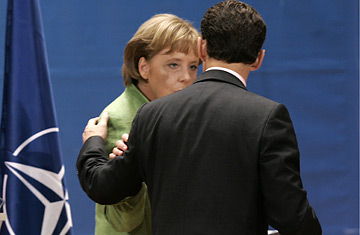
The German Chancellor and French President are united in opposing Ukraine and Georgia's joining the NATO alliance.
"It's easy to take a wrong turn in Bucharest's Palace of the Parliament," says Victor Micula, the Romanian official responsible for organizing this week's NATO summit. Ground was broken for the monstrous, labyrinthine structure, locally nicknamed the "Madman's House," in 1986 on the orders of Nicolae Ceausescu. Work had not yet been completed when Ceausescu was deposed and executed three years later. Indeed, says Micula, the job is still unfinished.
The same applies to NATO, the labyrinthine alliance whose heads of state and government are now meeting in the Palace — and which is also still under construction after 59 years. On Thursday NATO Secretary General Jaap de Hoop Scheffer unveiled a series of decisions reached by the 26 member states that will, he says, "substantially change the Alliance." Yet Scheffer's announcement bitterly disappointed three countries that had hoped to be on a fast track to NATO membership.
One aspiration got lost in the Madman's House because of a long-running but apparently trivial dispute over a name. Macedonia, a former constituent republic of Yugoslavia, had expected to be invited to join NATO alongside Albania and Croatia, another successor state to Communist Yugoslavia. But Macedonia's southern neighbor Greece perceives the name "Macedonia" as a threatened territorial claim on its own northernmost province, which is also called Macedonia. Right up to the wire, some NATO delegates remained optimistic about a solution for the country, which Greece still refers to as the Former Yugoslavian Republic of Macedonia, or, more euphoniously, FYROM. Instead, Scheffer announced a classic fudge. Albania and Croatia got their invitations, but Macedonia must wait until "a mutually acceptable solution" to its dispute with Greece has been found. Scheffer suggested this would be "very soon." "It's only delayed, it will happen," said Britain's Prime Minister Gordon Brown after the decision was announced. Since the dispute has lasted since the breakup of Yugoslavia in the early 1990s, and no resolution was found under the pressure of the summit, nobody is placing bets on when that will be.
Georgia and Ukraine also saw their hopes of a rapid road to NATO dashed. Both countries had sought entry into the Alliance's Membership Action Plan (MAP), the gateway to NATO membership. Instead they too will have to wait. NATO foreign ministers meeting next December will review their applications, but few observers expect that to yield much progress towards MAP even though ministers theoretically have the power to give the green light. The blockage, of course, stems from Russia, which has forcefully opposed its neighbors' NATO ambitions, however resolutely they've been supported by U.S. President George Bush. "I have always told Vladimir Putin, my friend, that it's in his interest that there be democracies on her border, and that he doesn't need to fear NATO; he ought to welcome NATO because NATO is a group of nations dedicated to peace," said Bush in Bucharest. Britain, Canada and a number of other member states agreed with his analysis. But Nicolas Sarkozy and Angela Merkel, whose relations have recently appeared strained, opposed MAP for Georgia and Ukraine. As the French President put it, he and Merkel "manifested publicly our perfect accord," which is grounded in their concern to avoid escalating tensions with Russia.
Sarkozy was being ungrateful. Earlier, President Bush, attending his last-ever NATO summit, had almost literally sung the praises of the French politician, whom he said had made an impact on the American people "like the latest incarnation of Elvis." Flattery of this kind is rare in any context, yet delegates in Bucharest, despite behind-the-scenes rows and disappointments, generally seemed more inclined to compliment than to complain. Though Macedonia packed its bags in disgust, Georgia and Ukraine managed to put some positive spin on events. And though Washington was disappointed, there was success for the U.S. on its plans for a missile defense system after the Czech Republic agreed to allow a radar system to be built there.
It's a sharp contrast to NATO's Riga summit in 2006. "The tone of the discussion is a lot lighter now than it was two years ago," says a NATO official. "Then the whole thing appeared to hang by a thread." In the Latvian capital, tensions ran high over the inequitable commitments of NATO members to military operations in Afghanistan — what the countries with sizable troop deployments in dangerous areas refer to as "burden sharing." Those tensions remain, but a commitment by France to send up to 1,000 troops to eastern Afghanistan, made before this summit and confirmed on Thursday, has alleviated immediate concerns over a fracture in the Alliance. Canada has threatened to withdraw its forces from the dangerous zone around Kandahar; the French move should allow the U.S. to redeploy more troops from the east to Kandahar and other hot spots. For Air Chief Marshall Jock Stirrup, the head of Britain's armed forces, this "sends a very important signal ... It's not just that the French are sending more troops, but it is to a very difficult area."
Britain, the second largest contributor of troops to Afghanistan, proposed a new initiative at the summit: A so-called trust fund to encourage countries that are not contributing troops to instead donate money and equipment to NATO operations. On Thursday, Prime Minister Brown revealed that 18 new helicopters and 8 nations had declared themselves ready to contribute to the fund. "This will become known as the burden-sharing summit," said Brown. That, at least, should be a name delegates can agree on.
